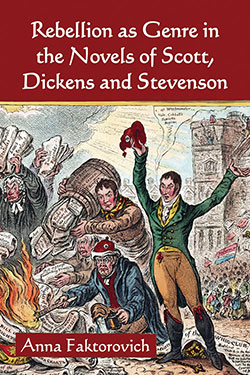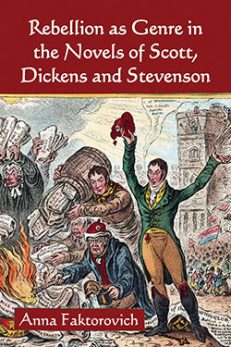Rebellion as Genre in the Novels of Scott, Dickens and Stevenson
Original price was: $39.95.$19.99Current price is: $19.99.
In stock
About the Book
When three of Britain’s best-loved and best-selling authors each publish at least two novels with a historical rebellion theme, there might be an interesting pattern worth examining. This is a long overdue study of the previously overlooked rebellion novel genre, with a close look at the works of Sir Walter Scott (Waverly and Rob Roy), Charles Dickens (A Tale of Two Cities and Barnaby Rudge), and Robert Louis Stevenson (Kidnapped and The Young Chevalier). The linguistic and structural formulas that these novels share are presented, along with a comparative study of how these authors individualized the genre to adjust it to their needs. Scott, Dickens and Stevenson were led to the rebellion genre by direct radical interests. They used the tools of political literary propaganda to assist the poor, disenfranchised and peripheral people, with whom they identified and hoped to see free from oppression and poverty.
About the Author(s)
Bibliographic Details
Anna Faktorovich
Format: softcover (6 x 9)
Pages: 264
Bibliographic Info: 17 photos, 19 graphs, chronology, notes, bibliography, index
Copyright Date: 2013
pISBN: 978-0-7864-7149-2
eISBN: 978-1-4766-0147-2
Imprint: McFarland
Table of Contents
Table of Contents
Chronology vii
Abbreviations Used for Sources xi
Introduction 1
Part I: A Genre under a Microscope
1. Rebellions and Reforms in Britain 9
2. Genre Theory and the Rebellion Novel 15
3. Criteria for Selecting Rebellion Novels 25
4. Readers of Rebellion Novels 31
5. Censorship, the Publishing Business, and Subversive
Literary Warfare 37
6. The Elements of Rebellion Novels 48
Part II: Sir Walter Scott and
the Invention of the Rebellion Genre
7. Scott’s Scottish Nationalism 63
8. Scott’s Structural Features 80
9. Scott’s Linguistic Features 97
Part III: Charles Dickens:
The Radical Socialist
10. Dickens’ Socialist Purpose 113
11. Dickens’ Structural Features 136
12. Dickens’ Linguistic Features 152
Part IV: Robert Louis Stevenson:
Patronage and Rebellion
13. Stevenson’s Radical Purpose 165
14. Stevenson’s Structural Features 187
15. Stevenson’s Linguistic Features 208
Conclusion 219
Chapter Notes 227
Bibliography 240
Index 247
Book Reviews & Awards
“a seminal body of impeccable scholarship…highly recommended”—Midwest Book Review.





